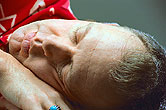
THURSDAY, Feb. 23 (HealthDay News) — Where you live in the United States may influence how well you sleep, researchers report.
Southerners report the most sleep disturbances and daytime fatigue, while people in the West have the least, according to a new study that created state-by-state sleep maps for the United States.
University of Pennsylvania researchers created the maps using national data collected by the U.S. Centers for Disease Control and Prevention.
“Sleep disturbance is a major public health concern. However, geographic dispersion of sleep problems, and the factors that may play a role in why some states or regions get better sleep, have been largely unexplored,” study author Michael Grandner, a research associate at Penn’s Center for Sleep and Circadian Neurobiology, said in a university news release.
“Our study generated the first sleep maps for the U.S. that include data on sleep disturbance and daytime fatigue across most of the country,” he added.
Oklahoma, Arkansas, Mississippi, Alabama and West Virginia had the highest rates of sleep disturbance and daytime fatigue. The findings are consistent with previous research showing that many of the states with higher rates of sleep disturbance and daytime fatigue are the same ones with higher rates of other conditions, such as obesity.
The researchers used telephone survey data from more than 150,000 adults. They determined that regional differences in mental health, race/ethnicity and access to medical care were the major reasons for the differences in sleep patterns among states.
“The take-home message from this study is that different regions of the country sleep better than others,” Grandner said. “We should begin to use this data to track patterns of poor sleep and try to understand why these patterns occur. Sleep is such an important part of overall health, we need to do everything we can to help give a good night’s sleep to those in the highest-risk regions.”
The study is published online in the Journal of Clinical Sleep Medicine.
More information
The U.S. Centers for Disease Control and Prevention has more about sleep and sleep disorders.

